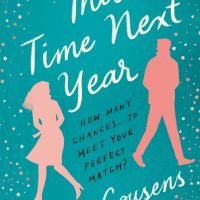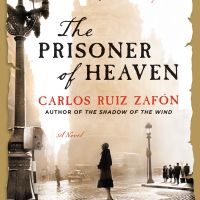I first read Carlos Ruiz Zafón‘s The Shadow of the Wind four years ago. At the time, it felt like one of the most magical, immersive stories I’d ever read. It wasn’t until a couple of years later that I found out it was the first in a series, and my mom was kind enough to gift the remaining three books to me that Christmas. The whole quartet of books have judged me from my shelves for two years, and I finally decided it was time to read the Cemetery of Forgotten Books series – starting with a reread of the book that started it all. I don’t reread books often, but I’m glad I was able to revisit this standout novel.
Summary
The Shadow of the Wind takes readers to Barcelona, Spain in the middle of the 20th century. We meet Daniel Sempere when he’s just a child, discovering an almost mythological cemetery of forgotten books. It’s here that he discovers – and falls in love with – an ultra-rare novel called The Shadow of the Wind by someone named Julián Carax. In fact, Daniel may have the last surviving copy of the book: All of Julián’s books have mysteriously been collected and burned.
As Daniel grows up through his teen years and into the dawn of his 20s, he retains a fascination with this nearly forgotten author. But he’s also being threatened by a foreboding man who wants to buy The Shadow of the Wind off of him, no matter the cost.
Eventually, and with the help of his idiosyncratic friend Fermín Romero de Torres, Daniel takes it upon himself to unravel the mystery surrounding Julián Carax. Who was he? What happened to him? Why is someone intent on destroying all of his books? Julián’s story may collide with events in Daniel and Fermín’s life, and unfinished business may put the duo and their loved ones in danger.
An ode to reading, and a sort of book within a book, The Shadow of the Wind is a labyrinthine novel in which fiction and reality collide. The truth may be hard to reach, but the journey is certainly captivating.
Review
When I first read The Shadow of the Wind four years ago, I loved it. It was the first time I’d read a book that was so meta, so involved with a love of literature and authors and reading. Furthermore, I loved the setting in a foggy, mysterious version of Barcelona. Spain is my favorite country – and in fact I lived there for a year – and it was fun to experience Barcelona through the lens of a novel.
Upon rereading The Shadow of the Wind, though, I feel like my feelings are more mixed. I do still love the story – and I’ll dive into why soon – but it was also hard for me to ignore two specific shortcomings.
The first con is how much sexism is thrown at female characters throughout the book. Sometimes it’s used to make a random male character seem unlikeable – and it works quite well for that – but my main issue is how it’s endlessly present in one of the main, supposedly good characters: Fermín Romero de Torres. He’s Daniel’s closest friend and sidekick throughout their snooping. So why is he constantly ogling women’s figures and pinching nurses’ butts? Why must his lust be mentioned so often? Fermín is meant to be a charming character, but for me he was often annoying and offensive, at least in regards to women.
On a related note, the second major con is how some of the female characters here are so… flat. Both of the love interests – Beatriz Aguilar and Penelope Aldaya – have almost no personality. I never understood either of them, and was never invited to. I wish they’d been developed beyond one-dimensional love objects. Because as they are in this book, they’re flatter than pancakes.
It’s not that all the female characters are undeveloped, though. Nuria Monfort, for example, is well crafted and dynamic. She has intentions and desires; she has agency and faces danger head-on. She’s the most richly drawn woman in this book, though even characters like Julián’s mother and Penelope’s governess have more personality than the two love interests. Perhaps this was intentional due to age of the men who “love” them? Whatever the reason, the romances would have been more compelling with more complete women.
Beyond those issues, The Shadow of the Wind does have a lot to offer, and it’s actually still worth the read.
For one thing, this is a novel that really expounds on a love for literature and, moreover, an unquenchable curiosity about the people behind the books. Just as some people worship rockstars, there are people who idealize authors, or at least want to know more about them and spread love for their work. The Shadow of the Wind feels like a story within a story, and it follows a sort of mythology about a reclusive, possibly dead author. Julián Carax becomes a legend, and the mystery surrounding him is the result of numerous lies and betrayals.
Reading the book is like falling into a maze, filled with false starts and dead ends. As Daniel and Fermín question people about Julián, working at getting to the truth for once and for all, they learn an array of details about his life. But just because someone says something doesn’t mean it truly happened that way. It’s almost like a game of telephone, where the message gets muddle the more it’s told. In other cases, characters don’t necessarily want to reveal the truth, especially not to a nosy stranger. Some deceits are very much purposeful.
The Shadow of the Wind is a mystery, and its setting truly amplifies this vibe. Though you may think of Barcelona as a sunny tourist destination, in Carlos Ruiz Zafón’s writing, we get to see another side of the city. This Barcelona is shrouded in fog, a little too dark to see everything clearly. In many ways, Barcelona becomes its own character. This adds to how immersive the story is: you feel like you’re walking these streets one late night, searching for clues in hidden alleys.
Despite those issues I mentioned early on, The Shadow of the Wind is still an intriguing story that will delight readers and spark your imagination. If you can get past the instances of sexism, the story itself is impactful.
Final Thoughts
I loved The Shadow of the Wind four years ago, and it mostly holds up upon my second reading. I’m disappointed at some of the issues I’ve discovered – issues I must have overlooked the first time around – and sadly I’ll have to demote it by one star. But in any case, this is a magical novel that paints an immersive Barcelona and a labyrinthine mystery of books, authors, and revenge.
Since this is the first in a series, I’ll be reading three more books from Carlos Ruiz Zafón in the coming weeks. Next up will be The Angel’s Game, followed by The Prisoner of Heaven, and finally The Labyrinth of the Spirits. Stay tuned for all my reviews of the Cemetery of Forgotten Books series!
More Books Set in Spain
The Bird King
I stumbled across G. Willow Wilson’s The Bird King on Goodreads shortly before it was published. Though I don’t often read fantasy, this book’s enchanting cover and summary drew me in, and I knew I needed to get it as soon as it was released. Like the last book I read – The Sisterhood by Helen…
The Sisterhood
For my birthday this year, my lovely sister got me three books. The first one I decided to read was The Sisterhood by Helen Bryan. It’s set in Spain, and my sister knows I love anything related to Spain. That plus the word “sister” in the title made it an ideal gift. The Sisterhood is…
The Time In Between
We’re only three months into the year, but I’m already certain that The Time In Between by María Dueñas will be among my favorites of 2017. Originally published in Spanish in 2009, The Time In Between has since become an international bestseller, and for good reason. The novel spans a decade as Sira Quiroga grows…
Incantation
One week ago, I stumbled across Alice Hoffman’s young adult novel, Incantation, at a small book store. I’m currently living in Lima, Peru, and although I speak Spanish, I’m not proficient enough to read full novels in Spanish yet. I found Incantation in the English language section, and it instantly captured my interest. The title…
Discover more from Amanda's Book Corner
Subscribe to get the latest posts to your email.






